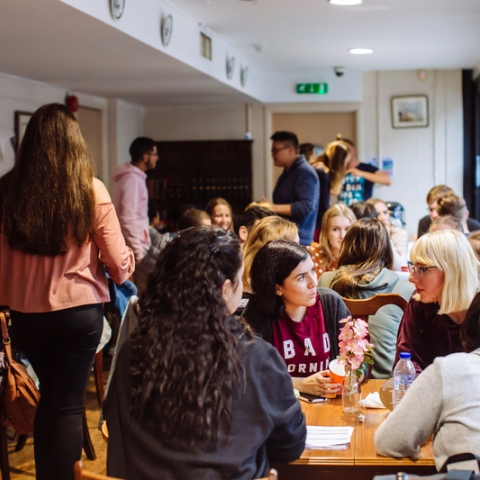
Sidebar navigation

Advice And Support On Safe Sexual Relations
Develop positive, healthy, consensual sex at university
You'll have many new experiences when you go to university, including developing healthy relationships with new friends and, possibly, new sexual relationships.
Living away from family and friends gives you more choice over how you spend your time. This includes the choice to be sexually active and explore your sexuality – but it's important to take your sexual health seriously.
Sex might not be a topic you've discussed openly before. But it's important to know your choices and your options when it comes to a safe sex life.
Trigger warning: We cover some topics here that may be uncomfortable to read if you've had a negative experience.
Get urgent support: If you're a current student at Portsmouth and you need urgent support in a crisis, find out how to get support after sexual assault, violence or harassment from the University and/or the police.
Sexual consent
You give your consent when you give permission for something to happen. This applies in all areas of life, including in your sexual relationships.
Just because you give permission for one thing to happen, like a kiss, doesn't mean you've automatically consented to other kinds of sexual behaviour. The same goes for your partner – always ask, never presume. It's important that everyone involved in any type of sexual activity has freely given their full consent.
Similarly, if you've given consent previously, your partner shouldn't assume that you've consented to sexual activity at any time in the future.
And you're allowed to change your mind – don't feel you must continue if you don't want to and do let your partner know you're not happy to carry on.
Consent cannot be given by anyone under the age of 16 in the UK.
Communicating enthusiastic consent
Enthusiastic consent is a newer model for understanding consent that focuses on a positive expression of consent. Simply put, enthusiastic consent means looking for the presence of a “yes” rather than the absence of a “no.” Enthusiastic consent can be expressed verbally or through nonverbal cues, such as positive body language like smiling, maintaining eye contact, and nodding.
These cues alone do not automatically represent consent so it is still necessary to still seek verbal confirmation. The important part of consent, enthusiastic or otherwise, is checking in with your partner regularly to make sure that they are still on the same page.
Enthusiastic consent can look like:
- Asking permission before you change the type or degree of sexual activity with phrases like “Is this OK?”
- Confirming that there is reciprocal interest before initiating any physical touch.
- Letting your partner know that you can stop at any time.
- Periodically checking in with your partner, such as asking “Is this still okay?”
- Providing positive feedback when you’re comfortable with an activity.
- Explicitly agreeing to certain activities, either by saying “yes” or another affirmative statement, like “I’m open to trying.”
Consent does NOT look like this:
- Refusing to acknowledge “no”
- A partner who is disengaged, nonresponsive, or visibly upset
- Assuming that wearing certain clothes, flirting, or kissing is an invitation for anything more
- Someone being under the legal age of consent
- Someone being incapacitated because of drugs or alcohol
- Pressuring someone into sexual activity by using fear or intimidation
- Assuming you have permission to engage in a sexual act because you’ve done it in the past
New relationships
Sexual consent can be cloudy in new relationships. When you meet someone new, be open to discussing your boundaries with each other. It might seem uncomfortable at first, but you'll be able to be more open and trusting with each other once you're on the same page. And that makes for a much better relationship.
Remember, not all sexual relationships are portrayed realistically in the media and online, especially in porn. When approaching a new relationship, remember that consent is rarely displayed in porn and your partner shouldn't be expected to perform in the same way either.
Lack of capacity to consent
If drugs or alcohol are a factor in your sexual activity, consent can be harder to be sure of. If you or your partner are too drunk or high to make informed decisions, or if your partner is unconscious, then you should stop engaging in any kind of sexual activity. This includes touching or kissing.
Sexual assault, violence or harassment
We take every report of sexual assault, violence or harassment seriously. If you're a victim of sexual assault, it's important to know that you're not to blame and there are confidential services you can go to for support and advice.
We can provide you with active support measures to feel safer on campus, signpost you to confidential medical and counselling services and take disciplinary action if needed.


